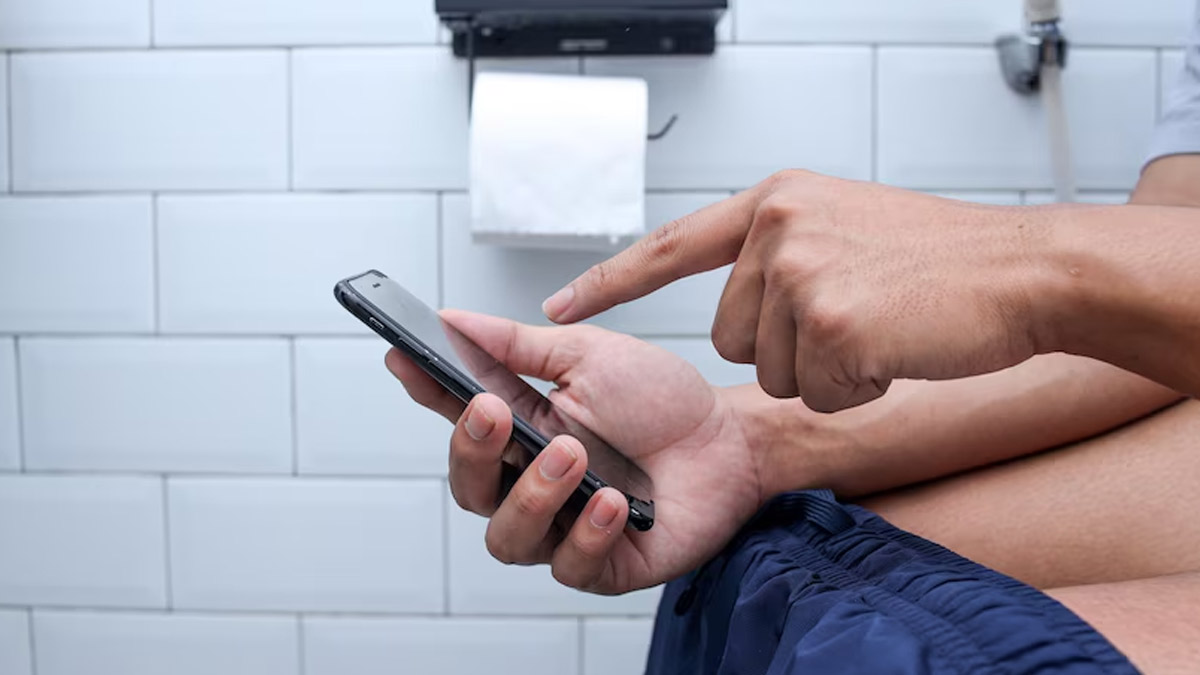
Picture this: you’re seated on the porcelain throne, mindlessly scrolling through your phone, checking on emails, or catching up on the latest memes on social media. It seems harmless, right? But while you’re lost in the digital world, your body might be quietly paying the price. The bathroom has become a mini-office for many, a place to steal a few extra moments of screen time. However, this seemingly innocent habit might be contributing to a not-so-pleasant problem – haemorrhoids. From prolonged sitting to straining, using your phone in the loo can trigger or worsen these painful swellings. Let’s flush out the truth about how your bathroom phone addiction could be messing with your health and what you can do to break the cycle.
Table of Content:-
To understand how merely using a phone in the toilet can harm your health, OnlyMyHealth interacted with Dr Vilas Kedar, Proctologist and Anorectal Surgeon, Mumbai. According to him prolonged toilet time can significantly contribute to the development and worsening of haemorrhoids.
The Habit That’s Hurting You

Dr Kedar shares his observations from his clinical practice: “As a proctologist and anorectal surgeon, I've noticed a common habit among many of my patients suffering from haemorrhoids: spending 30 to 45 minutes in the toilet, often watching reels, YouTube videos, or playing games on their phones. This prolonged sitting and straining during defecation can lead to or worsen hemorrhoid swelling.”
Defecation is a complex process that involves a coordinated dance of reflexes, sphincter relaxation, and pelvic floor relaxation, accompanied by a propulsive peristaltic wave. When you extend your time on the toilet by being engrossed in your phone, you may unconsciously strain, increasing intra-abdominal pressure. This unnecessary straining can cause hemorrhoidal veins to swell, leading to the development of haemorrhoids.
Also read: Haemorrhoids During Pregnancy: Expert Lists Symptoms, Causes And Prevention
Understanding Haemorrhoids

Haemorrhoids, commonly referred to as piles, are swollen veins located in and around the anus and lower rectum. Dr Kedar said that they are categorised into two types:
Internal haemorrhoids: These are located inside the rectum and are usually not visible.
External haemorrhoids: These form around the anus and can cause pain, discomfort, and bleeding.
Haemorrhoids are further classified into four grades based on their severity:
Grade 1: Anal cushions bleed but do not prolapse.
Grade 2: Anal cushions prolapse through the anus upon straining but reduce spontaneously.
Grade 3: Anal cushions prolapse on straining or exertion and require manual replacement.
Grade 4: Prolapsed anal cushions remain outside the anus at all times and are irreducible.
Also read: Can Spicy Foods Cause Haemorrhoids? Doctor States Facts
Ancient Insights and Modern Habits
Citing ancient medical text, Dr Kedar said, “Interestingly, the ancient medical text Sushruta Samhita Nidan Sthana (Chapter 2, Arsha Nidana) describes “Utkata Asana” (उत्कट आसन), a low squatting position, as a cause of haemorrhoids (Arsha). This ancient insight parallels the modern habit of sitting on the toilet for extended periods while using a phone.” Adding, he said, “The prolonged sitting posture and unnecessary straining mimic this ancient cause, thereby increasing the risk of haemorrhoids.”
Preventive Measures

Dr Kedar emphasises that prevention is key. He says, “For patients with Grade 1 and 2 haemorrhoids, avoiding long periods in the toilet and limiting phone usage while passing stool can help control or prevent the progression of haemorrhoids. Being aware of time and maintaining proper toilet habits are crucial steps in managing this condition.”
To protect your health, consider these tips recommended by Dr Kedar:
Keep Bathroom Time Short: Aim to spend no more than 5-10 minutes in the bathroom. If you’re not able to have a bowel movement within this time, try again later.
Ditch the Phone: Leave your phone outside the bathroom. Distracting yourself can make it easy to lose track of time, leading to prolonged sitting and straining.
Maintain Regular Bowel Habits: Ensure you’re consuming a fibre-rich diet and staying hydrated to promote regular bowel movements, reducing the need to strain.
Exercise Regularly: Physical activity helps stimulate bowel function, making defecation smoother and less strenuous.
Conclusion
While it might seem harmless, using your phone in the loo could be a significant factor in the development of haemorrhoids. By adjusting these small habits, you can take proactive steps to protect your anorectal health.
Also watch this video
How we keep this article up to date:
We work with experts and keep a close eye on the latest in health and wellness. Whenever there is a new research or helpful information, we update our articles with accurate and useful advice.
Current Version